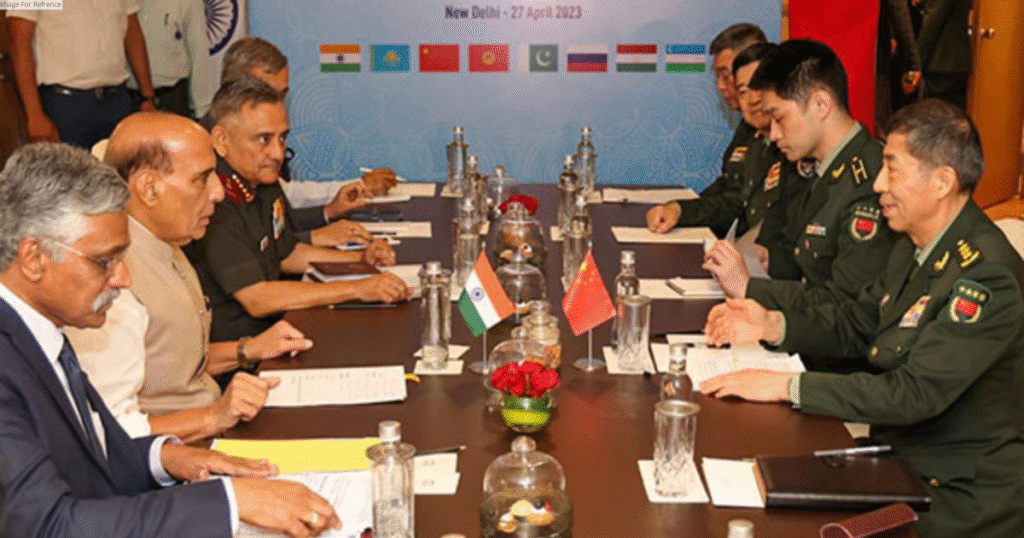Rajnath Singh Holds High-Stakes Meeting with Chinese Counterpart at SCO Summit 2025, Pushes for Stronger India-China Ties After 4 Years of Tension
At the 2025 SCO Summit, Indian Defence Minister Rajnath Singh met his Chinese counterpart to revive diplomatic and military ties after 4 years of strained relations, signaling a potential thaw in India-China dynamics
Defence Minister Rajnath Singh held bilateral talks with his Chinese counterpart, Admiral Dong Jun, on Thursday, on the sidelines of the defence ministers’ meeting of the Shanghai Cooperation Organisation (SCO) . The SCO defence ministers’ meeting was in the port city of Qingdao in China.

A Chinese readout of the meeting stated that both leaders made it clear that they do not seek confrontation with each other and agreed to enhance communication and mutual trust. The ties between the two nations have improved to a great extent since the 2020 Ladakh border standoff and a deadly clash at the Galwan Valley in June of that year.
The face-off effectively ended following the completion of the disengagement process from the last two friction points of Demchok and Depsang under an agreement which was finalised in October last year.
Singh gave insights into the meeting with Admiral Don in a post on X, formerly known as Twitter. “Held talks with Admiral Don Jun, the Defence Minister of China, on the sidelines of the SCO Defence Ministers’ Meeting in Qingdao. We had a constructive and forward-looking exchange of views on issues about bilateral relations,” the Indian defence minister wrote in the post.
Singh mentioned that the two defence ministers spoke about the restarting of the Kailash Mansarovar Yatra after a gap of nearly six years. “It is incumbent on both sides to maintain this positive momentum and avoid adding new complexities in the bilateral relationship,” he added.
Diplomatic engagements between India and China have increased after the two nations agreed to disengagement at the borders. In December last year, NSA Ajit Doval visited Beijing and held talks with Wang Yi under the framework of Special Representatives (SR) dialogue on the boundary dispute.
The decision to revive the SR mechanism and other such dialogue formats was taken at a meeting between Prime Minister Narendra Modi and Chinese President Xi Jinping in Kazan on October 23. However, India is cautious about China’s ties with Pakistan , especially in the backdrop of the Pahalgam terror attack.

At the SCO meeting, Singh refused to sign the joint statement of the regional body because it diluted India’s stand on terrorism and the Pahalgam terror attack, which left 26 dead in Southern Kashmir. The Ministry of External Affairs discussed the matter during a press briefing on Thursday.
The MEA noted that India’s proposal to include its anti-terrorism stand was “not acceptable to one particular country,” referring to Pakistan.
“The Defence Minister participated in the defence ministers’ meeting of the SCO. This meeting happened over two days and has concluded. They could not adopt a joint statement. Certain member countries could not reach consensus on certain issues, and hence, the document could not be finalised. India wanted concerns and terrorism reflected in the document, which was not acceptable to one particular country, and therefore the statement could not be adopted,” MEA spokesperson Randhir Jaiswal said at the presser.
“The Defence Minister, in his address, called upon these 11 countries to come together to fight terrorism in all its forms and manifestations… He also reiterated the need to uphold that the perpetrators, organisers, financiers, and sponsors of reprehensible acts of terrorism, including cross-border terrorism, need to be held accountable and brought to justice,” he added.
Qingdao, June 26–27, 2025 – In a landmark moment at the Shanghai Cooperation Organisation (SCO) Defence Ministers’ meeting in Qingdao, Chinese Defence Minister Admiral Dong Jun held bilateral talks with India’s Defence Minister Rajnath Singh – a high-profile first since the 2020 border standoff in Ladakh .
This was the first face-to-face interaction between the two defence leaders since an October 2024 de-escalation pact significantly cooled tensions along the Line of Actual Control (LAC). In that agreement, both nations agreed to mutual troop withdrawals to ease the four-year standoff. Today’s meeting highlights a thaw in military communication channels
Minister Singh urged Admiral Dong to pursue a “permanent solution” to the longstanding border dispute through a clearly defined, mutually agreed roadmap. Singh stressed that restoring trust following the deadly 2020 Galwan clash (which claimed 20 Indian and 4 Chinese lives) requires concrete and sustained measures
A central theme of Singh’s address was overcoming the deep-seated trust deficit. He emphasized that peace along the LAC cannot rely on temporary disengagements alone, but needs tangible on-ground verification and confidence–building processes to maintain momentum
Beyond bilateral security, Singh delivered a stern message on terrorism. He asserted that “terror epicentres are no longer safe” and made clear India’s intent to act decisively against groups like Lashkar‑e‑Taiba and The Resistance Front, which New Delhi holds responsible for the deadly April 22 Pahalgam attack that killed 26 people This underscores India’s dual approach of engagement with China while maintaining zero tolerance toward terrorism and state-sponsored threats.
India notably refrained from signing the joint Sco communique, objecting to its omission of the Pahalgam attack and a perceived tilt toward Pakistan on militant issues. Singh criticized the draft for undermining India’s anti-terror stand and demanded accountability for cross-border terrorism. He declined to lend India’s endorsement without explicit condemnation of threats against India
Singh’s meeting balanced cordial diplomacy and firmness. He gifted Admiral Dong a Madhubani painting symbolizing mutual growth and positive engagement, while firmly reminding that new complexities cannot be allowed to undermine this momentum
A clear path toward troop de‑escalation → verification → normalization remains the priority.
Singh advocated reactivating institutional mechanisms—such as Special Representatives and Corps‑Commander meetings—to reinforce dialogue and trust
He also reiterated India’s active role in enhancing security cooperation within regional frameworks beyond bilateral ties—signaling India’s broader agenda in Eurasian stability and counter-terrorism cooperation through the SCO platform.
Read Also : West Indies Pacer Destroys Australia’s Batting – 5-Wicket Blitz Avenges Legend’s Insult in Fiery Spell







